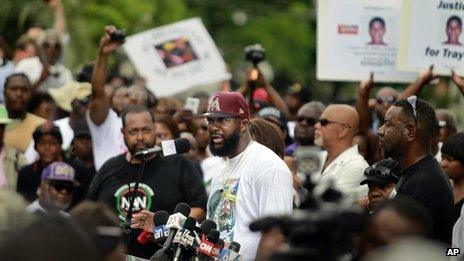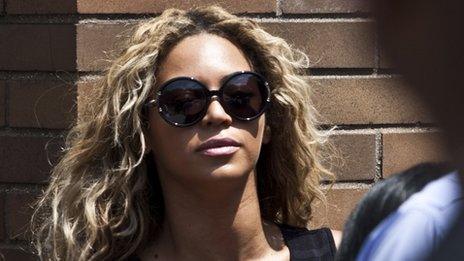Trayvon Martin: Protests across US at Zimmerman verdict
- Published
Trayvon's mother, Sybrina Fulton, gave a speech in New York
Protests have taken place in more than 100 US cities, a week after George Zimmerman was cleared of murdering unarmed black teenager Trayvon Martin.
Demonstrators demanded federal charges to be brought against Mr Zimmerman, 29, over the February 2012 incident.
A Florida jury agreed that the neighbourhood watch volunteer killed the 17-year-old in self-defence.
In comments on Friday, President Barack Obama admitted many black men in the US experienced racial profiling.
The protests against the court's decision were led by the National Action Network, headed by civil rights activist the Reverend Al Sharpton.
"We are not coming out with violence, we are coming to denounce violence. The violence that was perpetrated on an unarmed, innocent man named Trayvon Martin," Mr Sharpton told at a rally in New York.
Thousands gathered for "Justice for Trayvon" protests in at least 100 other cities across America, including Atlanta, Chicago, Los Angeles and Miami.
Mr Sharpton told supporters on Saturday morning that he wanted to see the scrapping of "stand your ground" self-defence laws, such as that in force in Florida.

Trayvon Martin's father was among those who rallied in Miami
"We are trying to change laws so that this never, ever happens again," he said.
The teenager's mother, Sybrina Fulton, told the crowd: "Today it was my son. Tomorrow it might be yours."
Rapper Jay Z and his wife, the singer Beyonce, appeared on stage at the New York rally.
In Miami, Trayvon Martin's father, Tracy Martin, was among those who gathered to the words of the civil rights song We Shall Overcome.
'Could have been me'
In an unexpected press call on Friday, Mr Obama said very few black men in the US had not experienced racial profiling.
Mr Obama said the pain that African-Americans felt around the case came from the fact that they viewed it through "a set of experiences and a history that doesn't go away".
He said African Americans were also keenly aware of racial disparities in the application of criminal laws.
"That all contributes to a sense that if a white male teen was involved in the same kind of scenario, both the outcome and the aftermath might have been different," Mr Obama said.
"When Trayvon Martin was first shot, I said that this could have been my son. Another way of saying that is Trayvon Martin could have been me, 35 years ago."
He shared his experiences of being racially profiled in the past, such as being followed while out shopping.
"There are very few African-American men who haven't had the experience of walking across the street and hearing the locks click on the doors of cars.
"There are very few African-Americans who haven't had the experience of getting on an elevator and a woman clutching her purse nervously and holding her breath until she has a chance to get off," he said.
Mr Obama called for the protests to remain peaceful, saying any violence "dishonours what happened to Trayvon Martin".
He said that although criminal matters and law enforcement were traditionally dealt with on a state and not a federal level, it would be useful to examine some state and local laws to see if they encourage confrontation in certain situations.
On Wednesday, US Attorney General Eric Holder cited the case as he urged a nationwide review of the "stand your ground" laws, which permit the use of deadly force if a person feels seriously threatened.

Singer Beyonce was among those at the rally in New York
The issue was never raised during the trial, though the judge included a provision about the law in her instructions to the jury, allowing it to be considered as a legitimate defence.
Trayvon Martin was shot dead by Mr Zimmerman after an altercation in a gated community in Sanford, Florida.
Last Saturday, the all-female jury of six found him not guilty of second-degree murder and manslaughter.
- Published20 July 2013
- Published18 July 2013
- Published15 July 2013
- Published12 July 2013